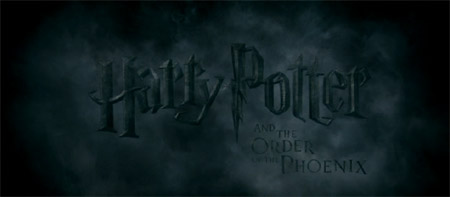
BUY IT AT AMAZON: CLICK HERE!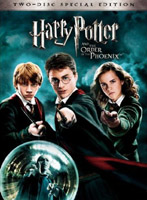
STUDIO: Warner Brothers
MSRP: $21.99
RATED: PG-13
RUNNING TIME: 139 mins.
SPECIAL FEATURES:
• Additional Scenes
• The Hidden Secrets of Harry Potter
• Trailing Tonks: Natalia Tena Leads a Very Personal Film Set Tour
• Harry Potter: The Magic of Editing
• DVD-ROM Enhanced Materials
The Pitch
Harry Potter (both the character and the film series) meets maturity.
The Humans
Directed by David Yates, adapted by Michael Goldenberg, starring Daniel Radcliffe, Rupert Grint, Emma Watson, Michael Gambon, Helena Bonham Carter, Robbie Coltrane, Ralph Fiennes, Gary Oldman, Jason Isaacs, Alan Rickman, Fiona Shaw, Maggie Smith, David Thewlis and Imelda Staunton.
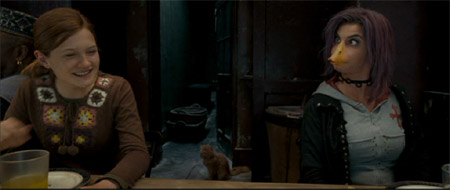
"Don’t make fun of Howard! He’s a GREAT Duck, you just don’t know him like I do!"
The Nutshell
Haunted by witnessing the murder of his friend and fellow student Cedric Diggory, Harry feels more alienated than ever and things quickly go from bad to worse. After fighting off a wild Dementor attack Harry is nearly expelled from Hogwarts for using magic outside of school. Seems the Ministry of Magic doesn’t quite believe his warning that Lord Voldemort has returned and they’re using their political muscle to try to silence Potter and push the Daily Prophet into smearing his and Dumbledore’s name. As Harry’s adult friends and mentors band together to fight Voldemort by reuniting the Order of the Phoenix, Harry has to deal with being an outcast at Hogwarts while students and teachers alike doubt him, including new Defense against the Dark Arts professor Dolores Umbridge, who seems more of like a Doris Day fascist dictator with a smile than an instructor. When she refuses to teach the students anything practical, the others look to Harry (who by now, has quite a bit of experience in these matters) to set them on the right path. But can he really prepare them for a fight with the Death Eaters? And what about his unusual connection to Voldemort and his frequent troubling dreams?
The Lowdown
Enough has been written about the Harry Potter book series this year (thanks to an utterly tremendous conclusion with Harry Potter and the Deathly Hallows) to fill a J.K Rowling tome of its own, so I won’t waste time discussing their virtues, of which there are plenty.
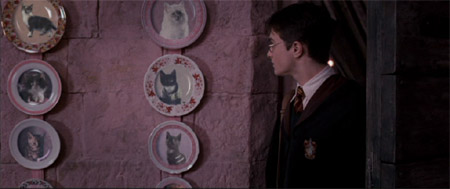
"Welcome to McMelmac’s, sir. Choose your dinner combo from the choices on the wall."
What I will argue is that virtually none of the filmed adaptations in this series has come close to matching their source material in quality as films. Worse yet, most of the Potter films have been nothing shy of over-produced, bloated bores. Rowling’s world is best imagined, and bringing it to excruciatingly detailed life is, I’m sure, a production designers dream. But the first two films weren’t really movies in their own right as much as they felt like direct adaptations; giant moving visual aids to the vastly superior texts. The third film had been the best in the series, with Alfonso Curaon’s smart direction and sharper script. Still, that film has a few rather clunky scenes and even some embarrassing acting, and it doesn’t quite manage to take on a life of its own as a movie. Mike Newell’s crack at The Goblet of Fire felt like a step backwards: what should have been an introduction to a darker, more menacing world felt far too safe, particularly for those of us who know the story and predicted every twist and turn. Where’s the fun in that?
Therefore, before watching Harry Potter and the Order of the Phoenix this past summer, I kept my expectations low. This was my least favorite of Rowling’s novels, featuring far too much clunky exposition and a much more limited portrait of Potter; often angry, always alienated, and much more difficult to actually like. Imagine my surprise when I found myself quite often moved by this movie, caught up with the characters and delighted by the surprises, the twists and the turns. In short, the movie made me feel a bit like a kid again, which is exactly the same kind of magic the books cast over you while reading them. Finally, after four lesser adaptations, Warner Brothers has figured out how to properly adapt Harry Potter.
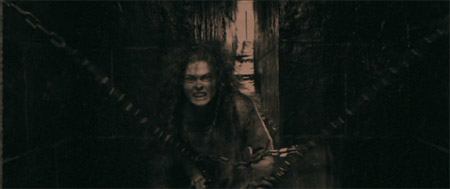
Amy Winehouse’s future looks bleak.
There are three major reasons for this, and I’ll start with one you might not expect. Order of the Phoenix is the only Potter film not to be adapted by Steve Kloves. Kloves has long said in interviews that his intentions were always to preserve Rowling’s world and stories for the movies to the best of his abilities. This loyalty to his source, while seemingly commendable, has become his undoing. While the novels feel fresh and imaginative, the Kloves scripted films (even those not directed by Chris Columbus) feel forced, garbled, overstuffed and confused. Die hard book fans may complain that this movie doesn’t have every detail, subplot, nook and cranny from the book, but playwright Michael Goldenberg should be commended for his script. Goldberg manages to streamline Order of the Phoenix, (the longest of the volumes and the shortest of the movies) into a stature none of the other series managed to achieve…a solid, standalone film. With his ability to quickly deliver important exposition and his trust in the actors to communicate plenty without excessive emotional dialogue, Goldenberg tweaks the source material just enough to allow it to stand on its own two feet. Occasionally he even outdoes Rowling herself (Snape’s Hogwarts flashback is handled far better in the film than in book five) and even when he fumbles in leaving out a key detail (a further explanation of the important veil during the climactic final battle) the performances usually pick up the slack (check out Daniel Radcliffe’s reaction during that scene. It tells you all you need to know).
Which brings me to the next reason Order of the Phoenix outshines the other four films. Sure, the cast of Harry Potter films has become a who’s who of quality veteran UK acting talent, and someone ought to give the casting director a raise. Even smaller roles that will become more important later (Natalia Tena as Tonks and George Harris as Kingsley Shackelbolt) are pitch perfect, and I can’t think of a single character in all five movies that has been miscast (including Umbridge; those die hard Pot-heads out there who insist that she should look like exactly like a toad straight out of a Roald Dahl book, please re-read the paragraph above and understand the importance of the word adaptation). Still, nobody is more important than Harry Potter himself, and Order of the Phoenix is where he gets the time to really shine. Radcliffe has gotten better with each movie, but when faced with some of the more emotional stuff in Goblet of Fire, I found him a bit lacking. Here, he’s given the trickiest incarnation of Potter yet. How do you make Harry likeable while he’s consistently angry, isolated, rebellious and confused? Radcliffe sells the character perfectly, knowing exactly how to deliver every line, even some of the more difficult material. Watch his reactions in the scene where he, Hermione and Ron pitch the idea of secret Dark Arts Defense lessons. Radcliffe conveys honest sensitivity in his eyes when he reveals he doesn’t plan on discussing the death of Diggory and somehow he manages to project anger and frustration simultaneously. Even when he’s given something seemingly ridiculous to do (as when he is briefly possessed by Voldemort near the end of the film and crawls around the floor like the sake) Radcliffe makes it work. The possession in this film becomes scarier than the entire graveyard scene from the fourth movie, and it’s mostly thanks to his fine performance.
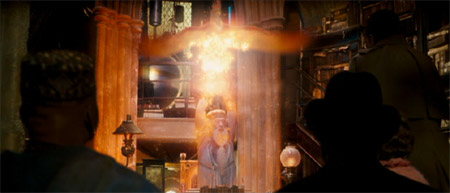
What a flamer…
Of course, none of the performances would be quite what they are without solid direction, and thankfully David Yates is perfectly suited for this series. Already working on Harry Potter and the Half Blood Prince, it’s my sincere hope that Yates stays attached to do the final film (and all I can say to him, and everyone involved, is good luck). Never before has the world of Harry Potter felt so real and approachable. While some complain that the early films filled viewers with a sense of awe, I insist they only give us mental cues, letting us know that we’re supposed to feel awed. The final wizard battle is the first time in this series where I felt myself getting caught up in the action. I knew what the outcome would be, I knew everything that was going to happen and yet somehow I was on the edge of my seat. Yates directs the actors realistically and doesn’t just rely on overproduced special effects. When the effects do kick in they never overshadow the actors. The performances are so strong you actually believe that these guys are flinging fire dragons and giant water balls at each other.
But Yates doesn’t skimp on the small details either, often favoring quieter scenes and brilliant montages rather than bombast to communicate the maturity and anti-authority themes running through book and film five. In some instances, his direction manages to make my least favorite Potter book better in my mind. I never realized exactly what a great metaphor Rowling created with the invisible winged horses that bring new students to Hogwarts. They’re invisible by everyone, of course, except those who have seen death. The quiet scene explaining this revelation between Harry and Luna Lovegood contextualized this metaphor. Death changes people, alienates people, and forces them to view the world differently, forces children who go through it at a young age to mature faster. No wonder Harry is so angry all the time. He’s being forced to mature through a childhood he never thought he could have in the first place. Now that he has it, he’s being forced to pay a price. So unfair!
I could go on and on about the direction, noting subtle touches about how the film begins (birds-eye view of Harry sitting alone on a playground in a rather desolate field, cut off from suburbia) and ands (birds-eye view of Harry, surrounded by his friends as they board the train home, plenty of bright green tree life surrounding them). Or the small touch of having Neville walking into the middle of two student wizards training. Or the look on Ginny Weasley’s face when Hermione tells Harry that Cho Chang couldn’t take her eyes off him. These are small, intimate details, but they’re so important to these films because it efficiently fills-in what we’re missing from Rowling’s dense text. There’s a lot going on with these characters, even the minor ones. Yates understands that and treats every last one of them with respect. All of us muggles should be grateful for that.
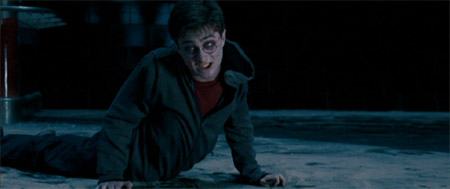
Potter Possesion Pilates is the latest health-nut craze!
The Package
Shiny as it is, the cover doesn’t really bowl me over and neither do the extras. Since the film shows so much maturity, I would assume the same consideration would go into the bonus material. Sadly, we’re hosted to a lame recap of all five movies (which is billed as “Clues to the Mystery of Harry’s True Destiny,” but should have been called “Clues to How to Make an Annoying Movie Promo”). Elsewhere, we get a tour of the sets and production offices by Tonks herself, Natalia Tena (who has a great personality, but this feature was clearly designed for kids) and a fairly cool look at editing with Yates and editor Mark Day which includes one of those home editing bay extras that allows you to edit a scene, which is always fun for about two minutes.
The best extras are the additional scenes, but only in how they illuminate precisely how tight of a script this was from the get go and how wise Yates and Day were in their editing of the film. There are no new scenes all together, just a few extra shots and some extended scenes, including one of Emma Thompson eating at the welcoming feast that goes on far too long, despite her talents.
The film looks and sounds tremendous and made me wish for a bigger TV.
Bottom Line: Extras lacking, this Potter adventure is one you deserve to own.